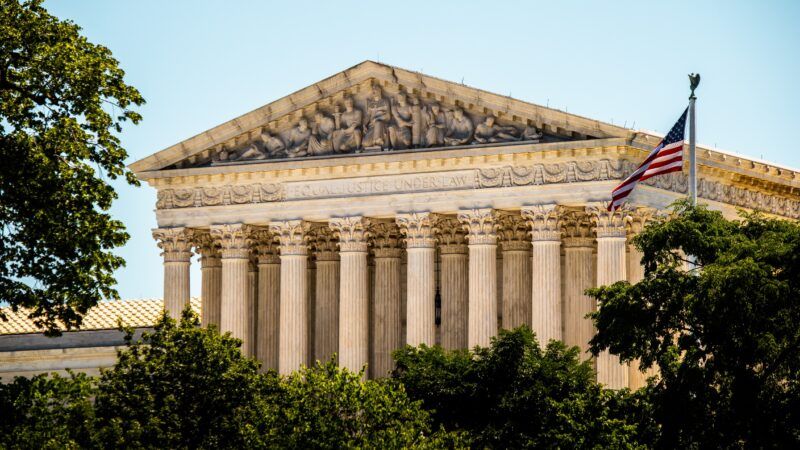Supreme Court Confirms That State Legislatures Can't Ignore the Constitution When Writing Election Rules
Chief Justice John Roberts decisively rejected the independent state legislature theory.

When it comes to setting the rules for elections, the Supreme Court ruled on Tuesday, state legislatures are not allowed to ignore the Constitution or evade judicial review.
It may not have been the most politically divisive issue in this year's Supreme Court docket—that honor probably goes to the still-yet-to-be-announced review of President Joe Biden's student loan forgiveness scheme—but Moore v. Harper was the Court's most potentially seismic case. It raised a fundamental question about the balance of power in election law: do state courts possess the authority to review and overturn state legislatures' decisions about the rules for federal elections?
They do, the Supreme Court unambiguously declared in Tuesday's ruling. "When state legislatures prescribe the rules concerning federal elections, they remain subject to the ordinary exercise of state judicial review," Chief Justice John Roberts wrote in the 6-3 ruling.
That might seem like constitutional common sense. After all, anyone with a passing understanding of constitutional law knows that Marbury v. Madison confirmed that courts have the power to review the actions of the other branches of government. But the crux of the Moore case rested on a novel theory bouncing around conservative legal circles: the "independent state legislature theory."
That theory has its basis in Article I, Section 4 of the U.S. Constitution, which explicitly grants state legislatures control over "The Times, Places and Manner of holding Elections for Senators and Representatives." Advocates of the independent state legislature theory argue that the Constitution places those decisions—including the drawing of congressional districts—solely in the hands of state lawmakers, with no space for courts to intervene. Therefore, the argument goes, there are no constitutional or legal constraints on state legislators when setting the rules for elections.
A redistricting battle in North Carolina became the testing ground for that idea. Last year, the North Carolina Supreme Court struck down a proposed congressional district map because it was an unfair political gerrymander. The court imposed a new map drawn by its hand-picked experts. Republicans and Democrats each won seven of the state's 14 congressional seats in the subsequent midterm election, held with court-drawn lines. The Republican lawmakers who drew the rejected map asked the U.S. Supreme Court to intervene and offered the independent state legislature theory in their arguments.
With a conservative majority on the Supreme Court, some liberal commentators feared that the independent state legislature theory was about to be enshrined nationally. It didn't help that some of then-President Donald Trump's cronies tossed around the theory as part of various schemes to overturn the results of the 2020 presidential election—even though the Elections Clause quite clearly applies only to congressional and senatorial elections, and it does not allow state lawmakers to intervene after an election has been held.
But Tuesday's ruling soundly rejected the independent state legislature theory.
"The Elections Clause does not vest exclusive and independent authority in state legislatures to set the rules regarding federal elections," Roberts wrote in the majority opinion, in which he was joined by Justices Amy Coney Barrett, Ketanji Brown Jackson, Elena Kagan, Brett Kavanaugh, and Sonya Sotomayor. (Separately, Kavanaugh also offered a concurring opinion.)
The importance of judicial review is one of the "fundamental principles" of America's constitutional system, Roberts wrote. "The Elections Clause does not carve out an exception to that fundamental principle."
The cross-ideological nature of the 6-3 ruling is a major blow to the independent state legislature theory's advocates—and to its critics who expected the conservative majority on the Court to rubberstamp a radical reinterpretation of the Constitution.
It's also worth noting that Justice Clarence Thomas does not argue for the independent state legislature theory in his dissent. Instead, he argues that the Court should have punted the case as moot after the North Carolina Supreme Court overruled its prior decision earlier this year.
"The federal defense no longer makes any difference to this case—whether we agree with the defense, disagree with it, or say nothing at all, the final judgment in this litigation will be exactly the same," Thomas argues. "The majority does not seriously contest that fact. Even so, it asserts jurisdiction to decide this freefloating defense that affects no live claim for relief."
That's a fair criticism, but the willingness of the Court's majority to lay down a clear signal about the independent state legislature theory is important, too, even if it made no difference to the acute issues in the underlying redistricting case.
The real winner in Tuesday's ruling is the constitutional system itself and its insistence on the separation of powers. Roberts notes that courts also do not have unchecked authority and "may not so exceed the bounds of ordinary judicial review as to unconstitutionally intrude upon the role specifically reserved to state legislatures."
You might also think about Moore v. Harper as a proxy fight between textualism and originalism—with advocates of the independent state legislature theory advancing a pedantic, letter-of-the-law reading of constitutional provisions against a deeper understanding of how the Framers intended the messy mechanisms of democracy to work. Indeed, Roberts points repeatedly to the founding era—to Marbury, to The Federalist Papers, and early constitutional law provisions in various states—as he dissects the problems with the theory.
"When legislatures make laws, they are bound by the provisions of the very documents that give them life," he writes in one particularly direct rebuttal to the idea that state legislatures should be freed from all constitutional restraints when writing election rules. As such, legislatures are "created and bound" by state constitutions and limited to particular authorities granted by the federal constitution.
"Both constitutions," Roberts concludes, "restrain the legislature's exercise of power."

Show Comments (109)